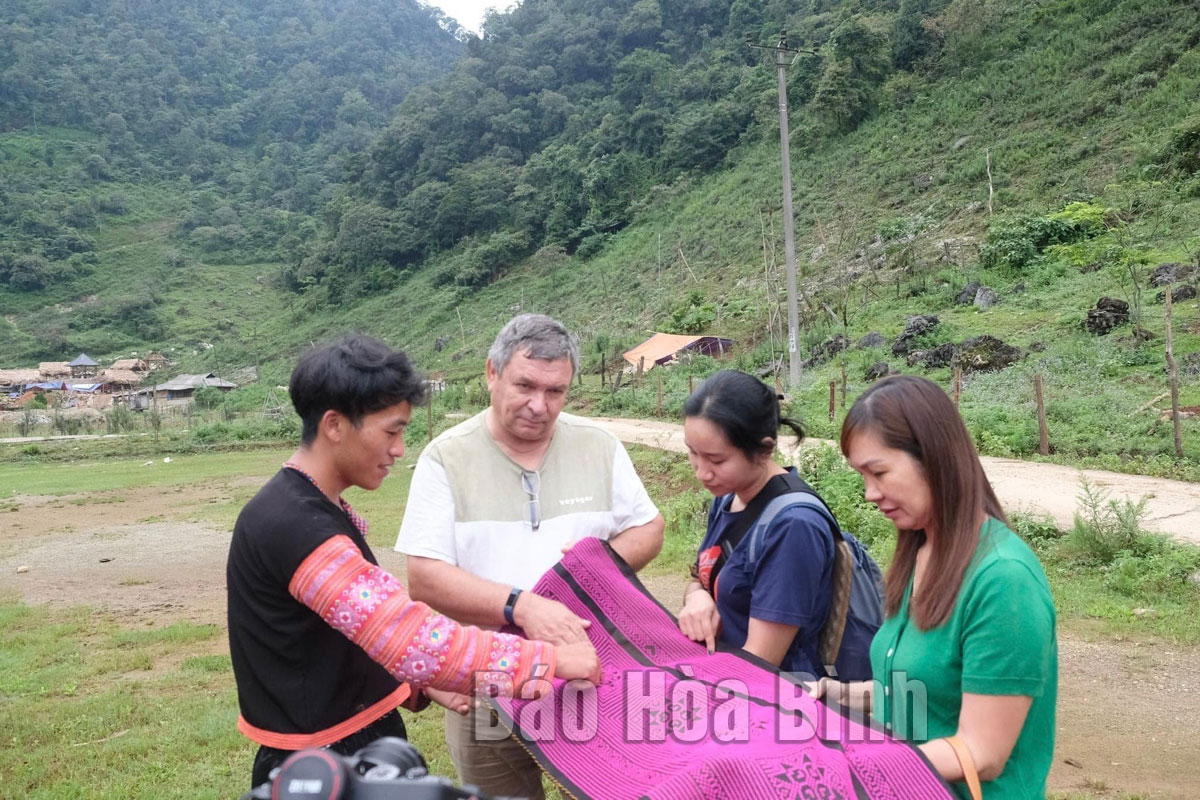
(HBO) - Hoa Binh province is giving priority to developing community-based tourism villages recognised by the "One Commune, One Product” (OCOP) programme in an effort to not only create jobs and improve rural earnings but also sustainably preserve local traditional culture.
Giang A La (far left), chairman and director of Hang Kia agriculture and
tourism services cooperative in Mai Chau introduces brocade products made by
H’mong ethnic minority people to visitors.
The diversity and human values of traditional customs of Muong, Thai, Dao,
H’mon ethnic minorities coupled with magnificent natural landscapes are paving
the way for the province to foster community-based and agricultu
ral tourism.
Many communes have been implementing the OCOP Programme to promote the brand
names and reputation of local tourism and seek partnership in boosting tourism.
Hoa Binh is now home to five OCOP-recognised community-based tourism villages
rated three to four stars. They include the villages of Hang Kia (run by Hang
Kia agriculture and tourism services cooperative - Hang Kia commune, Mai Chau
district), Lac (Lac Village agriculture, forestry and services cooperative -
Chieng Chau, Mai Chau), Da Bia (Da Bac Community-based Tourism JSC - Tien
Phong, Da Bac), Ngoi (Ngoi Hoa Tourism Investment JSC - Suoi Hoa, Tan Lac) and
Luy Ai (Phong Phu, Tan Lac).
Giang A La, chairman and director of Hang Kia agriculture and tourism services
cooperative, said in the hope of making Hang Kia an attractive destination to
both domestic and foreign travellers, the cooperative members have come up with
various exciting activities for them, for example, visiting plum orchards,
orange farms, and brocade weaving. In 2020, Hang Kia community-based tourism
village was honoured by the provincial People’s Committee as a 4-star OCOP
product. It has welcomed more than 1,000 tourist arrivals since the beginning
of this year, with revenue reaching over 1 billion VND.
Hoang Van Tuan, deputy chief of the provincial coordinating office for
new-style rural building, said in the coming time, the province will continue
to focus on developing rural and agricultural tourism services in tandem with
upholding local cultural identity and accelerating promotion of tourism,
cultural festivals, OCOP products as well as those made by craft villages.
The province also plans to increase training and upskilling in tourism
management for local officials and develop linkages among rural tourist
destinations to promote sustainability and enhance people’s livelihood, he
added./.
In Lac Thuy district, communes have been succeeded in promoting their One Commune-One Product (OCOP) products while others are still struggling to position their typical farming products in market. Some communes in the district still fail to have their products met OCOP programme’s requirements, while others have seen their certifications expired.
The inspectorate agency of Hoa Binh province has issued Official Dispatch No. 1090/TTr-PCTN to provincial departments, agencies, localities, business associations, enterprises, and investors regarding measures to improve informal component indexes of the Provincial Competitiveness Index (PCI).
Hoa Binh is taking concrete steps to improve its investment environment, with a strong focus on supporting businesses, settling obstacles for strategic investors, and creating opportunities for robust development in the coming years.
Under the blazing early summer sun, the construction site of Nhuan Trach Industrial Park (IP) in Luong Son district is abuzz with activities from dawn to dusk, a testament to the determination of the investor to meet their construction targets on schedule.



